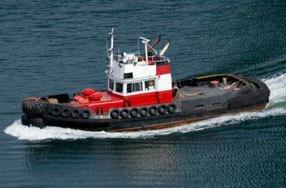NOT ALL LAW FIRMS ARE IN THE SAME BOAT
Unsafe Tug and Barge Equipment Injury Lawyers

Under the general maritime law, a seaman injured on a tugboat or barge due to defective, unsafe or unseaworthy equipment is entitled to damages for lost wages, loss of earning capacity, past and future medical expense, pain and suffering, disfigurement, loss of enjoyment of life caused by the injury, and damages for disability. As experts in maritime injury law, our award-winning lawyers understand the equipment used on tugs and barges. We regularly represent union and non-union seamen in claims against Crowley Maritime Company, Foss Maritime Company, Dunlap Towing Company and many other local tug companies. Because of our decades of experience handling claims against tug companies in inside and outside waters, we understand how hard you work and how an injury can impact your career, your family, and your future. When an injury occurs, you need an experienced maritime injury lawyer who knows how to effectively prosecute a claim and obtain maximum compensation for you and your family.
Our award-wining Seattle maritime injury lawyers have more than 65 years of combined experience representing injured tug and barge workers against some of the largest tug companies in the world. We offer a free case evaluation. Contact us today.
What is an Unseaworthy Condition?
Under general maritime law, an injured tug or barge worker can collect compensation if their injury was caused by an unseaworthy condition. This simply means that equipment was not reasonably safe or not fit for its intended purpose. As an example, a deck may be unseaworthy if the deck is covered with oil that makes the deck unreasonably slippery. A line may be unseaworthy if it parts or is not tied properly to a cleat. A gangplank may be unseaworthy if it is too steep or lacks necessary non-skid.
In order to make a recovery, we must show that the unseaworthy condition was a substantial factor in causing the injury. It need not be the sole reason for the injury and may combine with other factors to create the injury. Even if there was not specific unsafe equipment that caused your injury, you may still be able to make a recovery under the Jones Act if you can show that your employer was negligence or an unsafe condition or practice caused your injury. If you have questions about whether your injury was caused by an unseaworthy condition, contact one of our experienced maritime injury lawyers for a free claim evaluation.
Examples of defective equipment on tugs and barges that we handle includes the following:
- Parted tow lines
- Defective non-skid on decks and rails
- Unsafe rescue equipment
- Unsafe cranes
- Unsafe ladders
- Unsafe brows and gangways
- Unsafe saws without guards
- Unsafe grinding equipment and chippers
- Unsafe lifting equipment
- Defective tag lines
- Unsafe lines or deck equipment
- Unsafe winches
- Unsafe steps or platforms
- Slippery rails
- Defective capstans
- Unsafe or hazardous cargo
- Defective propane tanks or cooking equipment
- Defective tow drums
- Defective towing equipment, shackles, chain or rollers
- Unsafe fire equipment
- Unsafe skiffs
- Unsafe decks caused by improper non-skid or slippery substances
- Excessive noise exposure from loud equipment
- Defective safety glasses or goggles
- Hazardous chemical exposure
- Improper storage of chemicals
- Slippery ramps, gangplanks or vessel accesses
Unsafe or Defective Tug or Barge Equipment Lawyers in Seattle, Tacoma, and Everett
For more information or to schedule an appointment with an experienced maritime injury attorney regarding a case that involves a tug or barge injury, shipboard injury, maritime law, admiralty law or other workplace personal injury, please contact us for a free consultation or case evaluation.







